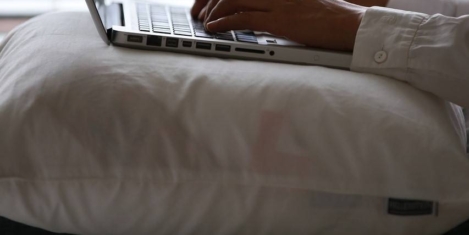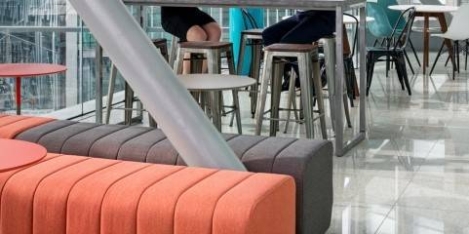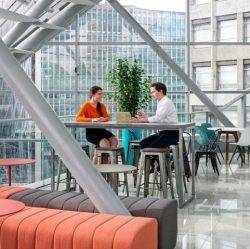To provide the best experiences, we use technologies like cookies to store and/or access device information. Consenting to these technologies will allow us to process data such as browsing behaviour or unique IDs on this site. Not consenting or withdrawing consent, may adversely affect certain features and functions.
The technical storage or access is strictly necessary for the legitimate purpose of enabling the use of a specific service explicitly requested by the subscriber or user, or for the sole purpose of carrying out the transmission of a communication over an electronic communications network.
The technical storage or access is necessary for the legitimate purpose of storing preferences that are not requested by the subscriber or user.
The technical storage or access that is used exclusively for statistical purposes.
The technical storage or access that is used exclusively for anonymous statistical purposes. Without a subpoena, voluntary compliance on the part of your Internet Service Provider, or additional records from a third party, information stored or retrieved for this purpose alone cannot usually be used to identify you.
The technical storage or access is required to create user profiles to send advertising, or to track the user on a website or across several websites for similar marketing purposes.
 Businesses and employees are calling on the UK Government to provide more protection for those who work in the gig economy. In a survey of nearly 5,000 workers and over 100 businesses by jobs site totaljobs, 90 percent of employees and 87 percent of employers said that more regulations were needed to protect the rights of gig workers. In addition, 64 percent of employers believe the gig economy’s importance will only continue to grow in the next year, as individuals turn to self-employment in favour of more flexible working arrangements.
Businesses and employees are calling on the UK Government to provide more protection for those who work in the gig economy. In a survey of nearly 5,000 workers and over 100 businesses by jobs site totaljobs, 90 percent of employees and 87 percent of employers said that more regulations were needed to protect the rights of gig workers. In addition, 64 percent of employers believe the gig economy’s importance will only continue to grow in the next year, as individuals turn to self-employment in favour of more flexible working arrangements.





 Office rents have begun to slip across Central London, and the chief reasons could be uncertainty around the outcome of the Brexit talks and the UK seemingly missing out on the rising level of global trade, suggests Cluttons’ London Office Market Bulletin Autumn 2017. While the report highlights that many locations in Central London have seen headline office rents hold steady for the better part of two years, rent free periods have been moving out in order to sustain this, but now appear to be at a critical tipping point, level, which is driving some landlords to consider alternative incentives, such as delayed completions. Freddie Pritchard-Smith, Head of commercial office agency at Cluttons said: “Many firms remain nervous about making a long-term commitment to more space, choosing either flexible overflow space or to reconfigure within their existing office. The exception to this of course remains the serviced office and TMT sectors, who have helped transactional levels in the West End to surpass 4 million sq ft already this year, which is paradoxical to the falling rental conditions.”
Office rents have begun to slip across Central London, and the chief reasons could be uncertainty around the outcome of the Brexit talks and the UK seemingly missing out on the rising level of global trade, suggests Cluttons’ London Office Market Bulletin Autumn 2017. While the report highlights that many locations in Central London have seen headline office rents hold steady for the better part of two years, rent free periods have been moving out in order to sustain this, but now appear to be at a critical tipping point, level, which is driving some landlords to consider alternative incentives, such as delayed completions. Freddie Pritchard-Smith, Head of commercial office agency at Cluttons said: “Many firms remain nervous about making a long-term commitment to more space, choosing either flexible overflow space or to reconfigure within their existing office. The exception to this of course remains the serviced office and TMT sectors, who have helped transactional levels in the West End to surpass 4 million sq ft already this year, which is paradoxical to the falling rental conditions.”
 Over half (52 percent) of people who work remotely feel their colleagues don’t treat them equally, claims a new study. Working remotely has become a highly sought-after job perk and having the flexibility to live and work where you please, regardless of corporate headquarters, often draws people to take one job over another. But a survey from VitalSmarts produced by David Maxfield and Joseph Grenny, authors of the bestsellers Crucial conversations and Crucial Accountability, found that remote employees have a significantly harder time with a number of workplace challenges than their onsite colleagues. 67 percent of remote employees complained that colleagues didn’t fight for their priorities compared 59 percent of onsite employees. 41 percent of remote employees believed colleagues say bad things about them behind their back compared to 31 percent of onsite employees and 64 percent of remote employees had changes made to a project without warning vs. 58 percent of onsite employees. Over a third (35 percent) of remote employees thought colleagues were lobbying against them vs. 26 percent of onsite employees.
Over half (52 percent) of people who work remotely feel their colleagues don’t treat them equally, claims a new study. Working remotely has become a highly sought-after job perk and having the flexibility to live and work where you please, regardless of corporate headquarters, often draws people to take one job over another. But a survey from VitalSmarts produced by David Maxfield and Joseph Grenny, authors of the bestsellers Crucial conversations and Crucial Accountability, found that remote employees have a significantly harder time with a number of workplace challenges than their onsite colleagues. 67 percent of remote employees complained that colleagues didn’t fight for their priorities compared 59 percent of onsite employees. 41 percent of remote employees believed colleagues say bad things about them behind their back compared to 31 percent of onsite employees and 64 percent of remote employees had changes made to a project without warning vs. 58 percent of onsite employees. Over a third (35 percent) of remote employees thought colleagues were lobbying against them vs. 26 percent of onsite employees.





























